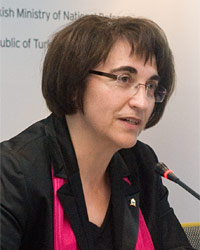Slovenian Defense Minister Ljubica Jelusic |
|||||||||||
Her Excellency Dr. Ljubica JeluŠič Our panel will discuss the Balkans and the Black Sea region. It is not easy to find commonalities between these regions. In fact, there are many differences between the regions and even more differences among the countries that lie within them. So what is common to all of us? THE SITUATION IN THE BALKANS First of all, the Balkans and the Black Sea areas are seen as sources of challenging problems, if not serious issues or actual threats. Second, a strong Europeanization process is going on within all the countries in both regions. We not only have countries that are already members of NATO and the European Union but we also have applicants for Euro-Atlantic integration. In addition, there is what I call an unfinished process of Europeanization. Whenever we speak about the Balkans and the Black Sea, we think about the area as a kind of “incomplete Europe,” a term that was used earlier in the workshop when we spoke about the Baltic States and the Baltic region. Macedonia, for example, has been in the MAP process for 10 years, but it is still waiting to become a member of NATO. Then we have Montenegro, which has been in the MAP process for three years, preparing itself with great enthusiasm not only for membership in NATO but also for membership in the European Union. We have Bosnia and Herzegovina, whose representative here, my dear colleague the defense minister, will explain to us the situation in Bosnia and Herzegovina during his presentation. We also have Serbia, a country that is a member of the Partnership for Peace program, and which is a candidate for European Union membership, but does not yet seek membership in NATO. And we have Kosovo, which has more than 60 international recognitions but which cannot yet be called a full-fledged state. One important point is common to all the Balkan countries: They would all like to become reliable partners in security arrangements. Moreover, we can see that all these countries are making the transition from security receivers to security providers. We also see that troops from all of these countries are participating in various international operations and missions all around the world. Many of these countries send their soldiers on United Nations missions under the U.N. flag, but, for the most part, their soldiers serve under the NATO flag, whether or not they are members of NATO or candidates for NATO membership. COMMONALITIES BETWEEN THE BALKANS AND THE BALTIC REGION The various Balkan countries are not all participating in international operations and missions in the same way, and are not approaching Euro-Atlantic integration in the same manner. Nonetheless, whenever the Balkan countries have bilateral exchanges or participate in multilateral or regional conferences, the fact that we all have troops in different operations makes it very clear that there is a strong connection between the Balkan region and our colleagues in the Black Sea region. All of us can speak about our troops in Afghanistan, and other activities as well.
|
|||||||||||

Top of page | Home | ©2010
Center for Strategic Decision Research
